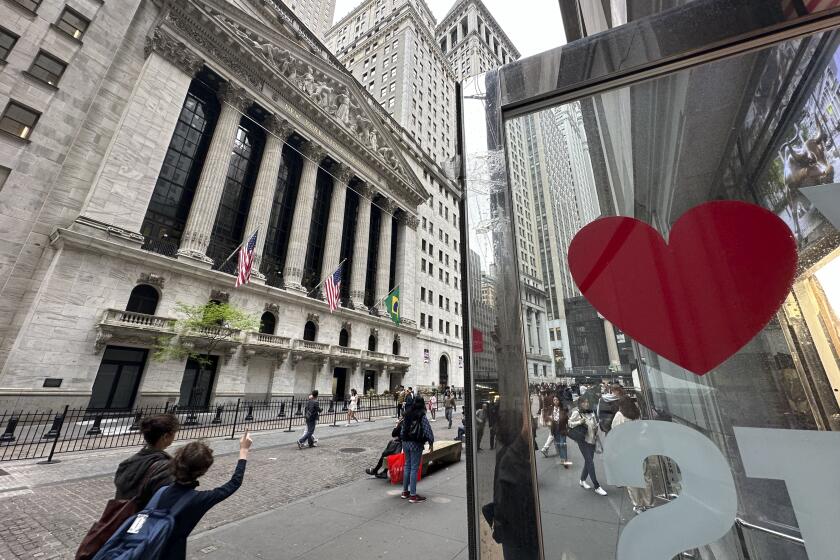Handshake Was Good Enough for His Deals
A Morley Benjamin handshake is more than a handshake.
It’s a symbol of a way of doing business and a philosophy, Benjamin’s philosophy. No wonder the septuagenarian belongs to the Plato Society.
Benjamin is chairman and executive officer of the Los Angeles-based Morley Group (Morley Construction Co., MSC Service Co. and Benchmark Contractors Inc.), which he started 40 years ago this Tuesday with $300, hard work and a lawyer’s help.
The lawyer, the late Aaron Levinson, who had an office in downtown Los Angeles, arranged it so that Benjamin, fresh out of the Midwest with his Army discharge and University of Michigan diploma, could get financing to cash in on the postwar construction boom by building 68 houses in Pacoima.
When the homes were sold, Benjamin made about $32,000--a huge profit to the young man who had given up writing for a living when he sold an essay for a paltry $25. An English major and classmate of the budding Arthur Miller, Benjamin turned to his father’s trade, construction, before moving to Los Angeles in 1946. He got his first glimpse of California when he was stationed at Victorville, his final duty post as a B-29 navigator-turned-radar operator during World War II.
When he collected his earnings from the home sales, Benjamin tried to pay Levinson, but the attorney said, “Well, you know, my work doesn’t come cheap, and it will take time for you to pay.” The price? The lawyer expected Benjamin to help others as he had helped Benjamin.
Practical, Not Altruistic
That was the beginning of a business based not on altruism but, from Benjamin’s point of view, practicality. As he puts it, “If you treat people fairly, they’ll treat you fairly.”
As he sees it, helping others is just part of it, though he certainly helped others as his company grew from building that first small tract to participating in the construction of some of the best-known commercial and residential projects in the Los Angeles area:
The Wells Fargo and Security Pacific buildings on Bunker Hill, Broadway Plaza downtown, seven office buildings in Los Angeles for Fidelity Federal Savings & Loan and, more recently, the Skyline condominiums at 9th and Hope streets, Sheraton Redondo in Redondo Beach, Encino Financial Plaza in Encino, Coast Savings building in Pasadena and Ocean Towers in Santa Monica.
After his partner, former Texan, Sherman (Tex) Given, joined Benjamin in 1948, they counseled young builders and donated a total of about $1 million in personal and company funds and other contributions to worthwhile causes, including the Music Center, Los Angeles County Museum of Art, City of Hope and Arthritis Foundation.
Profit Sharing for Workers
The latest company donation was $25,000 to the Los Angeles Public Library’s Science & Technology Department, one of the most severely damaged sections in the Central Library fire.
Benjamin and Given instituted a profit-sharing plan, and when Given retired in 1980, Benjamin reorganized the company and sold 41 1/2% of his stock to his employees. There are now 47 employees in Los Angeles, 20 in Irvine and 3 in Oceanside.
Officers of the firm hold 8.49% of the stock, he said, and he and his son Mark own 50.01%. Beyond owning stock, though, employees can participate in a cash bonus system. After 5% of the gross profits is given to charity, 50% is divided between the employees who contributed the most in terms of getting a job done right while getting it done in time or ahead of schedule.
It’s a way of giving people a hand without giving them a handout, as Benjamin looks at it, and it’s an incentive to produce. “It’s simple,” he says. “if you put somebody in business for themselves, they will work like that.”
Besides believing in the work ethic, he says he also holds dear such old-fashioned values as honesty and trust--”never breaking our word, paying our bills promptly and shaking hands on a deal.”
No Formal Contracts
Given and he never had a formal contract between them except a buy/sell agreement in case of death.
“If one person said ‘no’ to a deal and didn’t like it and still felt that way 24 hours later, the deal would be dropped,” Benjamin said.
They also made a number of handshake deals involving construction projects.
They did more than $250 million of work for one client. “And sometimes, we’d just go on a handshake, and sometimes we had a contract. Either way, we’d break our necks to do what was right, because they gave us their confidence, and we had an obligation,” Benjamin said.
The obligation: To preserve his company’s reputation, “because it takes 100 jobs for people to know who you are, but if you do one bad job, your name is dirt.”
For the same reason, he preaches paying what’s owed: “We’ve gotten the cooperation of subcontractors by paying them.”
‘Grind Subcontractors’
On this subject, he’s quick to add: “We used to take bids, and the low man would get it. If somebody was too low, we’d tell them to check their figures. What’s the point if the subcontractor loses his shirt and doesn’t give you the quality you want?
“Today, a lot of builders grind the subcontractors to come down on bids, saying, for instance, ‘You’re $85,000 high. If you come down, I’ll go with you.’
“I don’t believe in this. The low, qualifying subcontractor should get the job.”
He has seen other changes in the construction industry, of course, but the most noticeable one to him is the near-demise of the handshake deal, which has given way, in most cases, to the tightly drawn contract.
He blames this on our litigious society but is optimistic that construction deals will again become as meaningful as a Morley Benjamin handshake.
“Well, why not?” he asked. “A contract can be this thick.” He stretched his fingers as far as they could go.
“But if anybody wants to break that contract, they can.”






